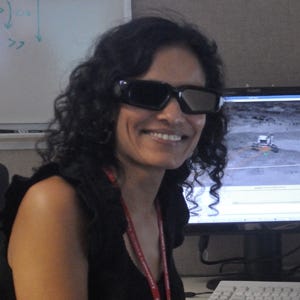Vandi Verma and Bhavya Lal make news at NASA
VANDI VERMA RUNS THE ROBOTS ON NASA’S MISSION TO MARS WHILE BHAVYA LAL IS CHIEF OF STAFF OF THE SPACE AGENCY
Vandi Verma, NASA
This article was first published by Global Indian Times on March 17, 2021
https://www.globalindiantimes.com/globalindiantimes/21/3/17/nasa-vandi-verma-bhavya-lal
March 17, 2021
Last month, the U.S. National Aeronautics and Space Administration’s (NASA) Perseverance rover landed on Mars, which is more than 130 million miles away. A video of the landing, taken by on-board cameras, has gotten over 14 million views.
From a NASA office in Pasadena, near Los Angeles, Vandi Verma (in photo) and her team of 150 roboticists develop the technology that remotely navigates and drives the rover; operates the robotic arm, which scoops up samples of the Martian soil, as well as the Perseverance’s helicopter, the first such outer-space device; and performs post-activity data analysis.
Verma is the chief engineer for Robotic Operations at NASA. “I grew up in India around airplanes and was fascinated with learning everything I could about space and aviation,” says Verma.
While studying at Carnegie Mellon University, Pittsburgh, she took a class in mobile robot programming and built an autonomous robot. “I was pretty sure that there was nothing I’d rather be working on than robots exploring space,” she told a NASA interviewer.
During her Ph.D., also at Carnegie Mellon, Verma interned with NASA collaborators and, in 2007 soon after graduation, started working full time at NASA.
Since 2008 she has been remotely driving rovers on NASA’s missions to Mars: Spirit, Opportunity, Curiosity, and the current Perseverance. In addition to the rovers on Mars, Verma has designed, developed, and operated rovers in the Arctic, Antarctica, and the Atacama Desert.
She enjoys coding and has written flight and simulation software used in operations. She has worked on several Artificial Intelligence research and development projects.
Verma’s father was a pilot in the Indian Air Force. For fun she flies an airplane; also hikes, with her twin toddlers.
Bhavya Lal, chief of staff NASA
Bhavya Lal is the other Indian American making news at NASA. Last month President Joe Biden appointed her as the agency’s acting chief of staff. She served on Biden’s team that oversaw the agency’s transition to the new administration.
Earlier, from 2005 to 2020, Lal served as a member of the research staff at the Institute for Defense Analyses Science and Technology Policy Institute. There, she led analysis of space technology, strategy, and policy for the White House Office of Science and Technology Policy and National Space Council, as well as federal space-oriented organizations, including NASA, the Department of Defense, and the intelligence community.
Lal’s recent projects include analysis of commercial activities in low-Earth orbit and deep space, in-orbit servicing assembly and manufacturing, small satellites, human exploration, space nuclear power, space exploration, and space science. She has published more than 50 papers in peer-reviewed journals and conference proceedings.
She has analyzed the achievements of Elon Musk’s SpaceX, Richard Branson’s Virgin Galactic, Jeff Bezos’ Blue Origin and other private companies in making space tourism a reality. Last year, discussing a Space X test flight, Lal wrote, “determining which activities would benefit from having the private sector play a greater role should be a matter of data and analysis—not dogma.”
Before working for government agencies, Lal served as president of C-STPS LLC, a science and technology policy research and consulting firm in Waltham, Massachusetts. Prior to that, she served as director of the Center for Science and Technology Policy Studies at Abt Associates Inc. in Cambridge, Massachusetts.
Lal has served on five National Academy of Science committees and advisory committees for NASA and the National Oceanic and Atmospheric Administration. She is co-chair of the policy track of the American Nuclear Society’s annual conference on Nuclear and Emerging Technologies in Space, and co-organizes a seminar series on space history and policy with the Smithsonian National Air and Space Museum, in Washington D.C.
She earned Bachelor of Science and Master of Science degrees in nuclear engineering, as well as a Master of Science degree in technology and policy, from the Massachusetts Institute of Technology. She holds a doctorate in public policy and public administration from George Washington University.
Lal attended a government-run school in R.K. Puram, Delhi. The Indian school system’s emphasis on science and technical education, she says, “is so critical to solving the problems of the 21st century, “ Education being central to Indian culture, she told The Times of India, “really does help.”
Asked what advice she has for others wanting to follow her path, Vandi Verma told a NASA interviewer, “Gain a breadth of knowledge in an area you’re passionate about by serially delving deeply into different aspects and you’ll have a tremendous time.”
(c) All rights reserved. Copyright under United States Laws.


